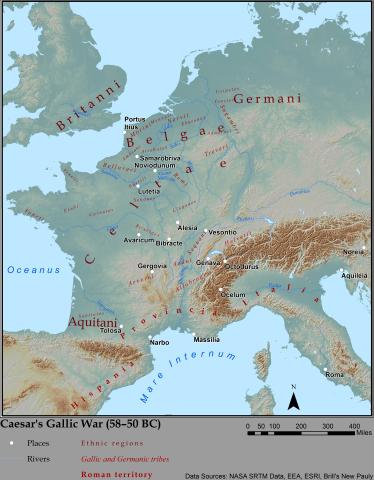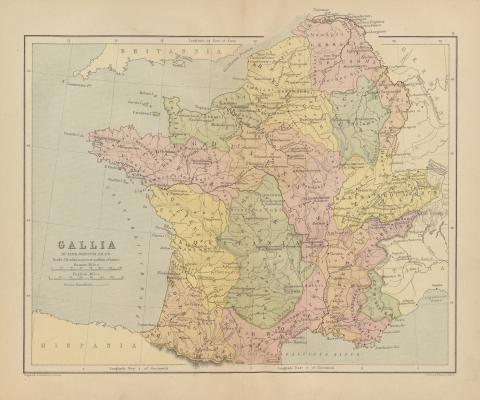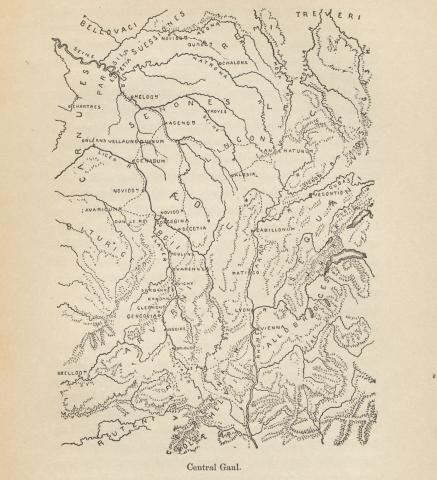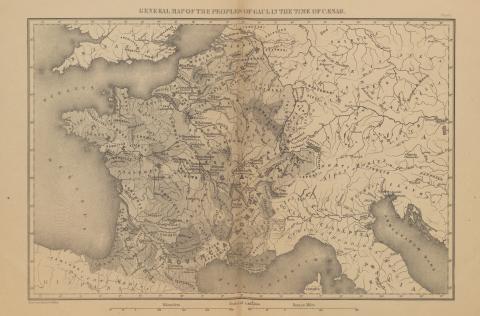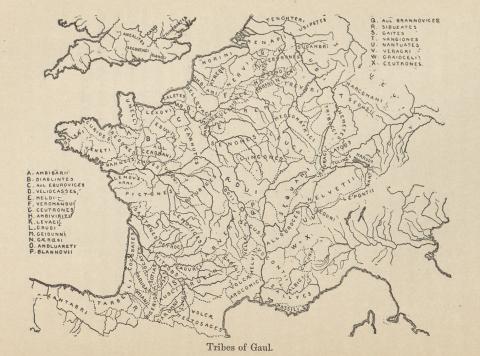In omnī Galliā eōrum hominum quī aliquō sunt numerō atque honōre genera sunt duo. Nam plēbēs paene servōrum habētur locō, quae nihil audet per sē, nūllō adhibētur cōnsiliō. Plērīque, cum aut aere aliēnō aut māgnitūdine tribūtōrum aut iniūriā potentiōrum premuntur, sēsē in servitūtem dicant nōbilibus, quibus in hōs eadem omnia sunt iūra quae dominīs in servōs. Sed dē hīs duōbus generibus alterum est druidum, alterum equitum. Illī rēbus dīvīnīs intersunt, sacrificia pūblica ac prīvāta prōcūrant, religiōnēs interpretantur: ad hōs māgnus adulēscentium numerus disciplīnae causā concurrit, māgnōque hī sunt apud eōs honōre. Nam ferē dē omnibus contrōversiīs pūblicīs prīvātīsque cōnstituunt et, sī quod est admīssum facinus, sī caedēs facta, sī dē hērēditāte, dē fīnibus contrōversia est, īdem dēcernunt, praemia poenāsque cōnstituunt; sī quī aut prīvātus aut populus eōrum dēcrētō nōn stetit, sacrificiīs interdīcunt. Haec poena apud eōs est gravissima. Quibus ita est interdictum, hī numerō impiōrum ac scelerātōrum habentur, hīs omnēs dēcēdunt, aditum sermōnemque dēfugiunt, nē quid ex contāgiōne incommodī accipiant, neque hīs petentibus iūs redditur, neque hōnōs ūllus commūnicātur. Hīs autem omnibus druidibus praeest ūnus, quī summam inter eōs habet auctōritātem. Hōc mortuō, aut sī quī ex reliquīs excellit dīgnitāte succēdit, aut, sī sunt plūrēs parēs, suffrāgiō druidum, nōn numquam etiam armīs dē prīncipātū contendunt. Hī certō annī tempore in fīnibus Carnūtum, quae regiō tōtīus Galliae media habētur, cōnsīdunt in locō cōnsecrātō. Hūc omnēs undique quī contrōversiās habent conveniunt eōrumque dēcrētīs iūdiciīsque pārent. Disciplīna in Britanniā reperta atque inde in Galliam trānslāta esse exīstimātur, et nunc quī dīligentius eam rem cōgnōscere volunt plērumque illō discendī causā profīcīscuntur.
notes
Druids and knights alone possess political power. Degradation of the masses. Religious and civil power of the Druids. Their doctrine imported from Britain.
Qui aliquo sunt in numero atque honore: 'who are of any note and are held in any estimation' (Anthon).
aliquo numero: ‘of any account’ (Walker); ‘in any consideration’ (Moberly).
genera: 'classes'. Literally, 'kinds', or 'orders'. (Anthon)
plebes: here a noun of the fifth declension, cf. plebs. (Allen & Greenough). Compare the Roman plebs
cum…premuntur: a general condition expressing repeated action, cum meaning 'whenever' or 'as often as'. (A&G 542)
aere alieno: 'by debt'. Aes alienum means literally, 'the money of another', i. e., due or owing to another. The first money coined by the Romans was of brass, and hence the use of aes in this sense (Anthon)
nobilibus: Compare Roman nobles
magnitudine tributorum: 'the weight of taxes' (Anthon).
iniuria: 'the oppression'. More literally, 'the injurious', or 'insolent treatment' (Anthon).
Sese dicant: 'give themselves up'. (Anthon)
quae dominis: (dat. of poss.) 'as masters have' (Allen & Judson)(A&G 373)
Druides: Compare Roman Priests
equitum: here means 'knights', not 'cavalry'. The 'knights' mentioned in this passage were the Gallic aristocracy, and the 'men of rank' (nobilibus) mentioned in § 2 were the most distinguished of the knights (Rice Holmes). Compare Roman equites
religiones: 'questions of religion' (Rice Holmes).
si qui. . . populus: 'if any one, whether private individual or tribe' (Rice Holmes)
decreto non stetit: ‘does not abide by the decision’ (Walker).
his...decedunt: his is dative, de via being understood with decedunt, just as in English one might say 'Get out ', meaning 'Get out of the way' (Rice Holmes); 'make way for them in the street' (Allen & Greenough).
incommodi: partitive genitive following quid (Allen & Greenough).
Huc omnes...parent: In § 5 Caesar has said that the Druids 'are judges in nearly all disputes' (fere de omnibus controversiis . . . constituunt). Probably the suitors who appealed to them were equites (§ 3), who alone could afford the expense of the journey, and who, having, as Caesar says (§ 3), unlimited rights over their dependants, may have settled their petty disputes without having recourse to Druids. The Druids had not a monopoly of jurisdiction. The Aeduan Vergobret (i.16, § 5 and p. liv) had 'the power of life and death over his countrymen', just as fathers had over their wives and children (vi.19, § 3); and the chief magistrate of every tribe adjudicated on offences against the state (i.4; v.56, § 3; vii.4, § 1), though the punishment which he inflicted may have been sanctioned and superintended by Druids (Rice Holmes).
vocabulary
ădhĭbĕo, -ēre: have present; consult; summon, invite
trĭbūtum, -ī n.: payment, tribute
servĭtūs, -ūtis, f.: slavery, servitude
Drŭĭdes, -um m.: Gallic priests
dīvīnus, -a, -um: divine
săcrĭfĭcĭum, -iī, n.: sacrifice
prōcūro, -āre: attend to
rĕlĭgĭo, -ōnis, f.: religious obligation, worship
interpretor, -ārī: explain, interpret
ădŭlescens, -entis: young; (subst.) young man
concurrō, -currere, -currī, -cursum: run together, assemble
admittō, -mittere, -mīsī, -missum: let go, admit, commit
hērēdĭtas, -ātis f.: inheritance
dēcrētum, -i n.: decree, decision
interdīco, -ĕre, -xi, -ctum: forbid, warn
impĭus, -a, -um: wicked
scelerō, -āre: pollute, desecrate
dēcēdō, -ere, -cessī, -cessum: depart, go away, withdraw
ădĭtus, -ūs n.: approach, advance; approach; admittance; privilege claim
dēfugiō, -ere, -fūgī: run off, flee
contāgĭo, -ōnis f.: contact, association
incommŏdum, -ī, n.: trouble, detriment, misfortune
hŏnos, -ōris m.: honor, distinction
commūnicō, -āre: share, communicate, divide with
praesum, -esse, -fūi: be at the head of; be in charge of
excello, -ĕre, -cellŭi, -celsum: be eminent
succēdō, -ere, -cessī, -cessum: follow after, succeed, take the place of
suffrāgĭum, -i n.: vote, suffrage
prīncipātus, -ūs, m.: first place, leadership, supremacy
contendō, -ere, -dī, -tus: strain, strive for
consīdo, -ĕre, -sēdi, -sessum: settle, take position; hold a session
cōnsecrō, -āre: dedicate, consecrate
rĕpĕrĭo, -īre, repperi, rĕpertum: find; originate
trānsferō, -ferre, -tulī, -lātum: bring through, carry over
dīligēns, -entis: diligent, scrupulous, attentive

